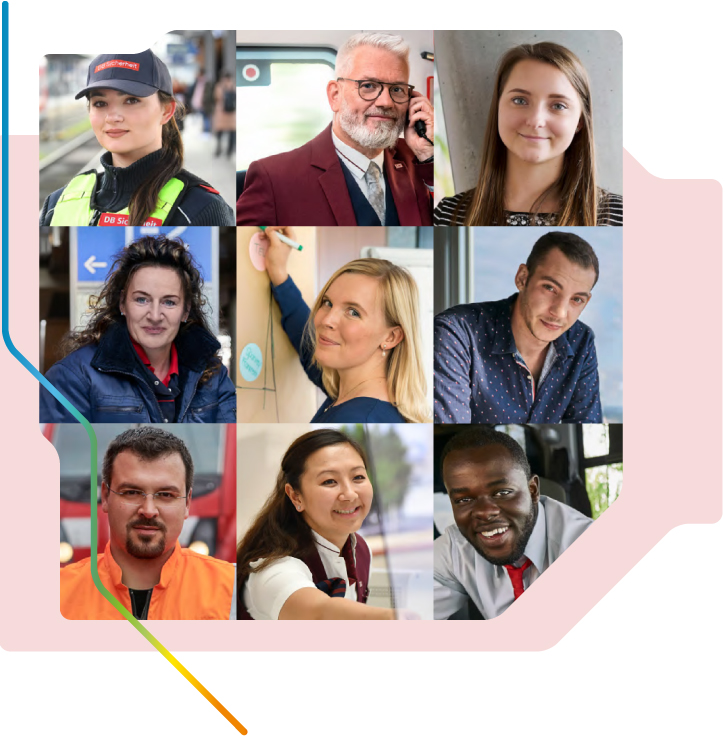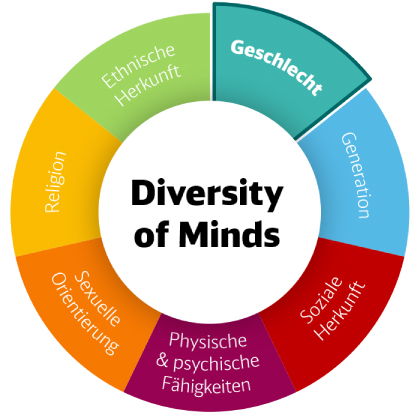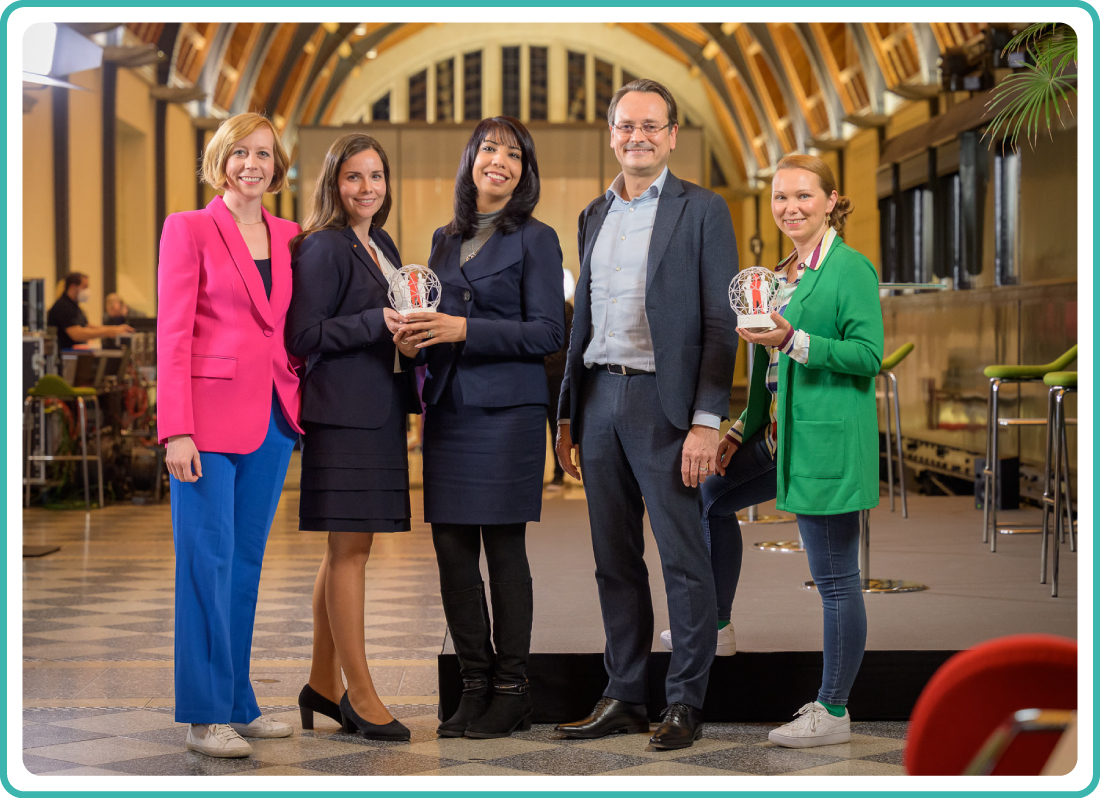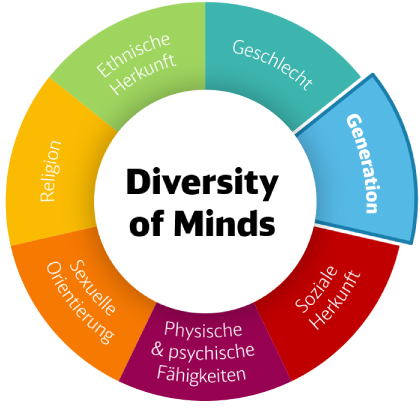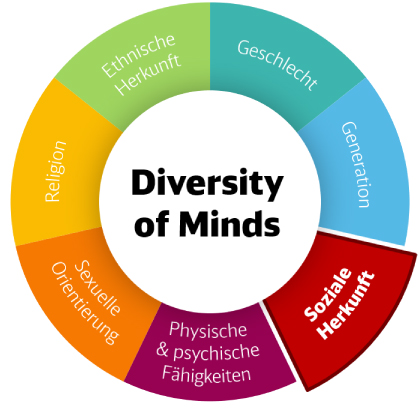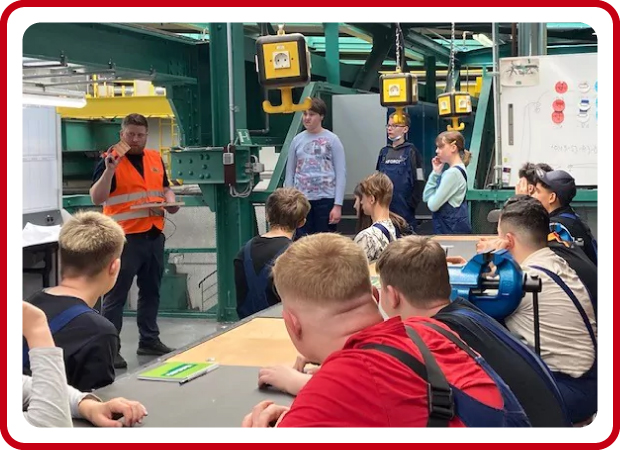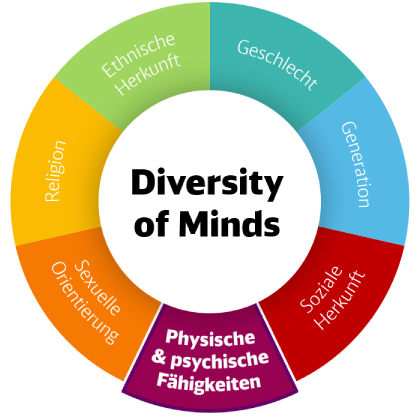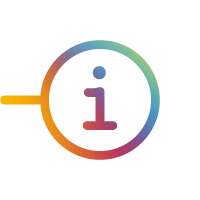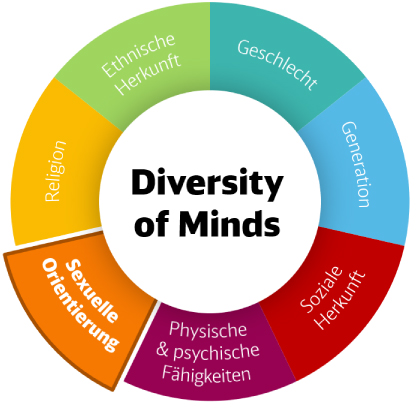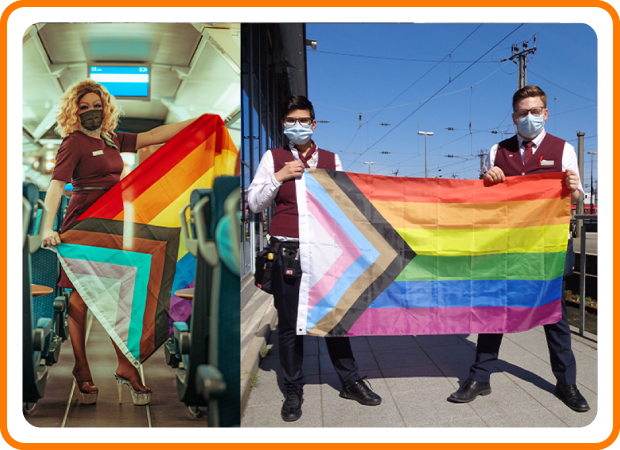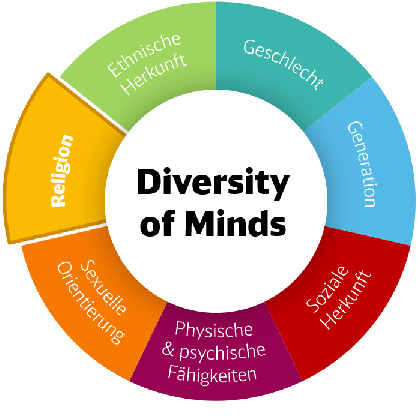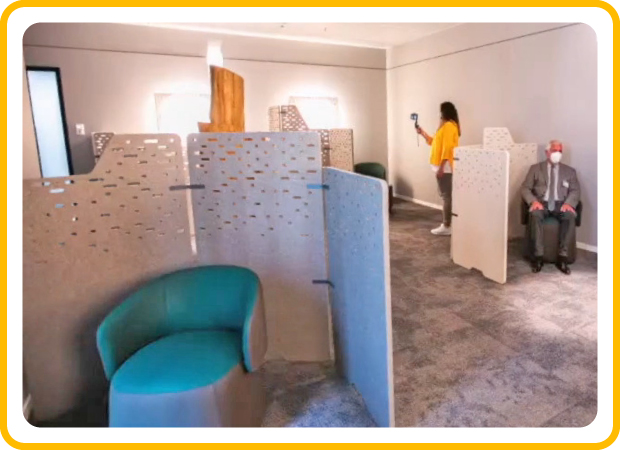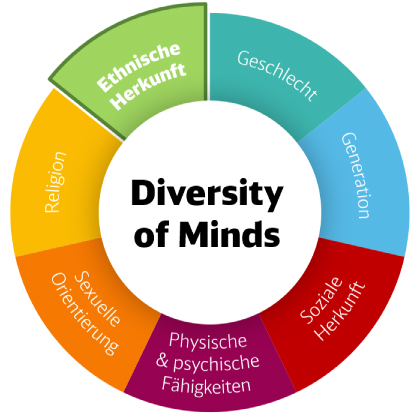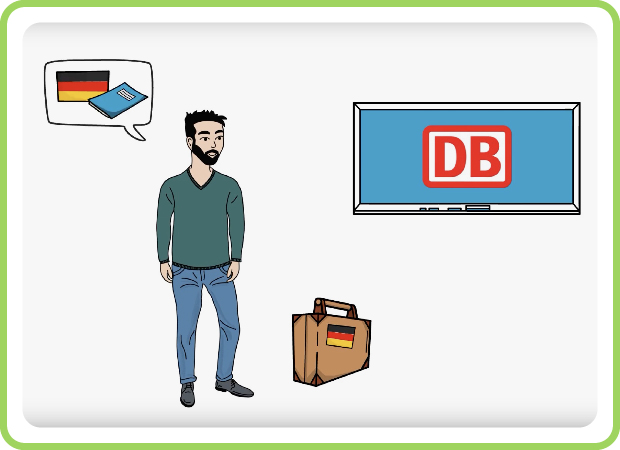Article: Diversity dimensions
Diversity at DB means diversity in genders and gender identities, generations, social origins, ethnic origins and nationalities, religions, physical and mental abilities, and sexual orientations just as much as for diversity in perspectives, skills and professional experience. After all, DB's workforce has a broad range of ideas, experiences and values that goes beyond the core dimensions of diversity. We also call this "diversity of minds”.
Strength through diversity.
By seizing the opportunities offered by diversity and by using all perspectives, we strengthen our innovative capacity, recruit and retain staff better, and get closer to our customers.
DB as a cosmopolitan employer.
Deutsche Bahn is open to employees who embrace differences with an open mind and make the Group what it is with their different skills and lifestyles.
Overview of diversity dimensions
Gender: success with mixed teams
By the end of 2024, we want to see women in at least 30% of management positions at DB. We're committed to equal participation in the long run, so we're taking measures to increase the percentage of women in the company, especially in management positions. We promote role diversity and gender-independent measures for ensuring a good work-life balance. We support gender-sensitive thinking, communication and action. Why? Out of conviction, because gender equality is non-negotiable and also because it's essential to our company's success.
In addition to a change in our corporate culture, we'll also need concrete actions such as performance contributions from all managers (who are committed to these goals regardless of their own gender) and gender-equitable design of all HR tools and measures for recruiting, professional development, advancement, and employment conditions. And of course an important aspect of gender equality is equal pay for men and women. The DB Group offers all employees fair, performance-based and non-discriminatory remuneration that is reviewed regularly.
To improve career prospects, we offer flexible working models matched to your stage of life, such as part-time, vacation choice models, preferred shifts, where-you-want jobs, job sharing, working from home, mobile work from abroad, and sabbaticals. Personalized career advancement and improvements in our corporate culture are also crucial here. We take a clear position on equal participation with initiatives such as DB International Women's Month and the #wirsindIN initiative. We also scrutinize hiring figures carefully on a quarterly basis to uncover potential improvements.
We deal with issues like sexual harassment head-on at DB. The ombuds service and the workplace threat management team are points of contact for anyone needing advice in private or work-related situations involving threats or discrimination.
At work: promoting strong women in operations
During Diversity Week 2022, four Impuls-Awards went to strong women and their groundbreaking projects at the Diversity Summit. Award winner Wencke Wallstein had this to say after the event:
"Along with the wonderful Hoda Karimian, I'm one of the four winners of the Impuls-Award. It's a great award, and the #diversity of Deutsche Bahn is reflected in the diversity of the award winners. ... Only diverse representatives can represent all interests. ... Shape your own job and don't be afraid to contribute ideas for a better DB. ... I'm taking this award as an inspiration to stay committed, and I encourage all of my women colleagues to stick together and dare! Dare to work in engineering, dare to work in operational management, and support others. Together, with a lot of creativity, we'll create a great DB." (Wencke Wallstein, Head of Digitalizing Provisioning (DiBe) project, 11/2023)
Generations: mastering change together
The current average age at DB is relatively high. Around half of our employees will leave DB in the next ten years, in part because of their age. That means we're in the middle of a generational change.
When so many employees retire, that affects everyone because they take their expertise, experience and networks with them. This knowledge needs to be preserved and passed on. At the same time, we're gaining a lot of new and often young employees with new skills who come to us with a wide range of perspectives. This transition means the needs of our workforce are changing.
To position DB as an attractive employer and leverage the competitive advantages of generational diversity, we're setting up a systematic generation management program to establish conditions for intergenerational appreciation and dialogue, and to ensure employee retention. People over 50 are also very welcome at DB. They bring a lot of experience and expertise to the table, things that are important success factors for DB. Our workforce includes people from four generations. In 2021 alone, 2,300 new employees over 50 years of age started work at DB.
At work: learning from each other
A lot of our employees have a wealth of experience after many years of service. As senior experts, retired employees can give their younger colleagues a hand by sharing their knowledge – promoting dialogue between generations. Since younger employees also bring valuable knowledge and experience when they come to DB, experienced staff can learn from newcomers as well. In what's called "reverse mentoring," the roles are reversed and the junior staff share what they know with their more experienced colleagues.
End of expander contentSocial background: everyone is welcome here
At DB, all job applicants and employees have the same opportunities, regardless of where they come from and how they grew up. This is important to us because in Germany, the education, profession and income of parents often determine their children's career path and success. We have a variety of projects and measures to work against this injustice. For example, we usually conduct a telephone interview first during the hiring process. That keeps the focus on content, and factors like clothing and gestures stay in the background.
A person's education, profession, leisure activities, clothing, speech and gestures are all shaped by parental influences and affect their later chances of advancement. These factors can play a subconscious role in job interviews, for example when applicants are expected to show certain language skills. But such expectations lead to one-sided decisions that aren't in the company's best interests. Studies show clearly that people who gain social status through education are highly resilient and adaptable and have clear expectations about their careers. They're also solution-oriented and often more assertive.
At work: start-up and transition assistance for the labor market
DB hires thousands of new employees every year, and we feel that it's important to give a chance to people who've had a difficult start in life. This includes breaking down barriers at work for people from financially or educationally disadvantaged households who are looking for training. DB is doing just that with initiatives like "Chance plus" – and has been since 2004. In partnership with the employment agency, this program gets young people ready for vocational training. In addition to getting a first impression about what the work is like, they receive lessons in German, mathematics and English. Thanks to this tailored approach, most participants go from finishing the program straight to starting their vocational training – a win-win situation for everyone. By providing many options for career changers, DB also enables people who have already completed vocational training to reorient themselves within 3 to 18 months, for example as signal setters, train drivers or on-board service staff. So a lot of career options are available regardless of one's initial training.
End of expander contentPhysical and mental abilities: seeing strengths
We all have our limitations. We're all very different and have different physical and mental characteristics. That's why we focus on the abilities of our employees and not on their disabilities.
Jobs in the rail industry can be demanding. For safety reasons, greater physical and mental requirements apply for many of our employees, such as train drivers, signal setters and train attendants. In recent years, however, DB has found new technical aids that enable a significantly larger number of people to begin rail careers.
We like to hire people with different physical and mental abilities. In recent years, the fraction of employees with disabilities at DB has been between 5% and 7% – above the statutory quota.
The Inclusion Center, established in Talent Acquisition in 2021, is working hard to improve the hiring figures further, and our representation committees for disabled employees are always involved in these processes. In addition, the Equal Opportunity Committee, which is committed to eliminating discrimination at work, was formed from the Group Representation Committee for Disabled Employees in 2011.
Preventive health care and the inclusion of all employees are also promoted by the independent Health and Social Issues unit. The occupational health management unit develops operational frameworks, structures and processes so that work and organization can be arranged to promote health while empowering and motivating employees to lead a healthy lifestyle. With the MUT-Hotline from ICAS, DB offers anonymous professional counseling for people facing emergencies or other difficulties. It provides DB employees with free 24/7 telephone assistance from qualified psychologists and psychotherapists. There are also preventive and integrative in-company integration programs with the aim of quickly finding suitable new career prospects for employees, where they can put their knowledge and experience to use.
At work: award-winning role models
In the Health and Social Issues unit, we award an inclusion prize every year. Among the exemplary projects were two disabled-accessible jobs for shuttle drivers between depots in Cologne, and the inclusion of deaf employees in the maintenance unit.
Video info: S-Bahn Berlin GmbH with "Accessible (sign language) videos with information about construction projects" project
The goal was to make passenger information accessible to all with simplified German, subtitles and sign language.
End of expander contentSexual orientation: love the one you want!
The abbreviation LGBTIQ* stands for lesbian, gay, bisexual, trans*, inter* and queer people. We want to create a corporate culture characterized by trust and respect and offering the same recognition and opportunities to people of every sexual orientation and gender identity. There should be neither overt nor covert discrimination at DB because we're all equally worthy of respect.
To achieve these things, we want to provide information and raise awareness. With various measures, we're tackling them together. These measures include information and counseling, year-round campaigns, the patronage of DB CEO Dr. Richard Lutz for our sexual orientation and gender identity diversity dimension, and the activities of our employee network, railbow. In order to show appreciation for the diverse lifestyles of our employees, we implemented an important measure in 2022 that benefits the LGBTIQ* community in particular: Our employees can now choose their own company clothing regardless of their biological sex or gender identity. This step sends a strong message for open-mindedness and diversity and reflects our attitude as a cosmopolitan and diverse employer.
At work: our railbow network.
DB has long campaigned against anti-LGBTIQ* discrimination. With railbow, for example, there has been an employee network for gay, lesbian, bisexual, inter* and trans* people at DB since 2011. In 2021, we worked with railbow members to develop a guide for transitioning at work. It's directed at trans* people who want to know how to organize their transition within the context of their employment at DB. It's also available to managers, employees and HR staff who want to learn how they can best help trans* employees.
More about "railbow" on www.railbow.deutschebahn.com
Religion: Uniquely different. beliefs for all
We all worship in our own Uniquely different. ways. Easter, Festival of Sweets, Ramadan – so many different holidays! At DB, we don't want to forget anyone. That's why we offer a diversity calendar that includes all the celebrations of the different religions and groups, printed or for integration into the Outlook calendar. We work with people from many different cultures, so it's important to know and respect everybody's feast days.
Employees with special religious rules or customs need understanding and respect; DB offers cultural coaching so that both can grow and thrive. After consulting with and getting approval from the appropriate contacts, we also set up interdenominational prayer rooms. DB also observes a culture of remembrance. For years, Deutsche Bahn has been committed to a critical and responsible examination of its own history. It is DB's historical responsibility to repeatedly remind people of the Reichsbahn's involvement in the crimes of the Nazi regime and to keep the memory of the victims alive.
Examples of our culture of remembrance include the Track 17 Memorial at Grunewald Station in Berlin where the systematic deportations from the city began, and the permanent exhibition Die Deutsche Reichsbahn im Nationalsozialismus ("Deutsche Reichsbahn in Nazi Germany") at the DB Museum in Nuremberg. DB supports the Yad Vashem Remembrance Center in Jerusalem and is a member of the German Friends of Yad Vashem.
We want to treat every worldview with respect, be it Buddhist, Christian, Hindu, Jewish, Muslim or any other. Large organizations like ours bring together individuals from a wide range of religious backgrounds. By providing places of silence, expanding the selection of foods in the cafeteria and fostering understanding and respect, we help to bring together different religions and worldviews at DB.
At work: pause, meditate, pray
DB employs people with a wide range of worldviews and religions, and we're proud of that. We create spaces for quiet contemplation and prayer for all of our employees. One example is the Raum der Stille ("Room of Silence") in Frankfurt, an interfaith space that provides all employees a place for a short break from their daily work routine, be it to pray, meditate or simply get away from it all for a moment.
End of expander contentEthnic origin: from interculturality to action against racism
Our employees come from more than 100 countries. We benefit from that every day, because this diversity offers a lot of potential. Having so many different perspectives makes us more capable of developing innovative solutions and products. Our DB Cultures network promotes this by sharing international experiences, thus strengthening intercultural cooperation.
With such a diversity of ethnic origins and nationalities, the real challenge is in actually making use of its enormous potential. Only then can synergies be formed across teams and organizations. A broad range of language skills and cultural knowledge can be the key to new markets and customer groups. Learning from each other and breaking into new markets together – that's a model that works.
DB also takes a stand against racism. Since 2000, more than 13,000 DB vocational trainees and cooperative education students have taken part in the annual contest entitled Bahn-Azubis gegen Hass und Gewalt - Gemeinsam für ein tolerantes und respektvolles Miteinander ("Deutsche Bahn Trainees against Hatred and Violence – working together for tolerance and respect"), taking a clear stand against xenophobia, right-wing extremism, racism and discrimination in creative year-round projects.
At work: setting out for a new life
We also want to enable successful integration of refugees. Education and work are two keys to successful integration, which we promote with our Chance plus program. It provides retraining or function-specific training that guides refugees into DB training pathways. With a vocational degree, they can achieve long-term integration in the labor market. For employees who are refugees or of foreign descent, DB has also launched its Social and Cultural Integration project (German abbreviation SUKI). With training, advice and assistance, we provide our new employees with help outside of work: language assistance, intercultural training, advice on legal matters and contracts, dealing with authorities, and many other everyday matters that can cause major problems.
More about "SUKI" on www.stiftungsfamilie.de
End of expander content